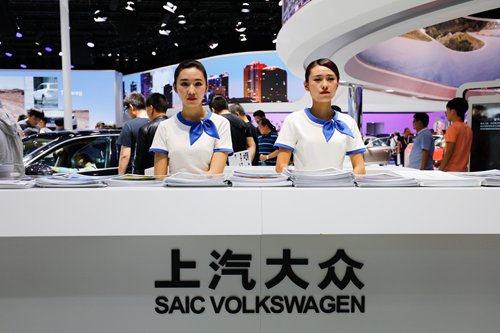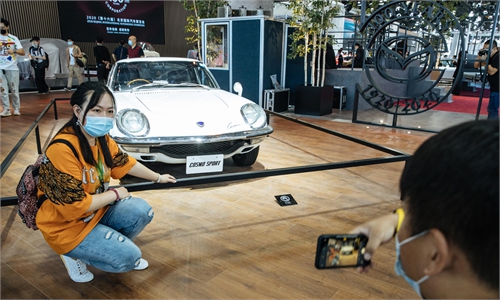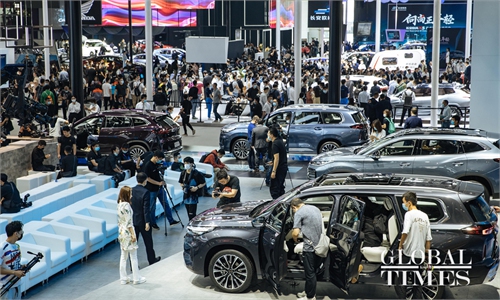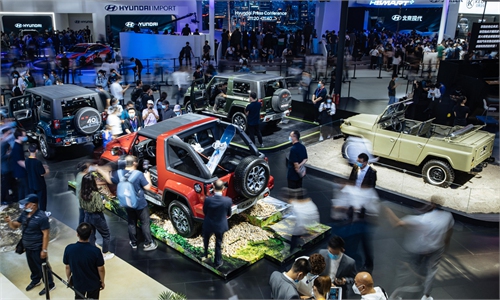Foreign automakers optimistic on China
Growing interest, investment for NEVs in world's biggest car market

Two ladies welcome visitors at the exhibition booth of SAIC Volkswagen joint venture in a Beijing auto show. Photo: IC
While auto fairs in Detroit and Geneva have been cancelled due to the COVID-19 pandemic, the 2020 Beijing Auto Show — which showcases the latest models and offers a look at the revival of China's auto industry -- has created a buzz in the world's largest car market.
Among more than 300 new car models revealed at the show, 40 percent are new-energy vehicles (NEVs) using the technologies of electricity or hydrogen, and attracting a flood of interest.
A flurry of foreign automakers see an opportunity in the booming NEV market in China, the world's second-largest economy, which is leading the global recovery amid the pandemic.
"The 2020 Beijing Motor show provides a symbol of hope… and a strong reminder of the resilience of this great country," Oliver Zipse, chairman of the board of management at BMW AG, said at the show.
The German automaker's efforts fit well with the goals of China, which is promoting renewable energy and the efficient use of resources, Zipse noted. For example, production at BMW's joint venture plant in Shenyang, Northeast China's Liaoning Province, has been powered purely by renewable electricity since the end of 2019.
Having already invested more than 64 billion yuan ($9.39 billion) in multiple high-tech facilities in Shenyang, the German auto giant's joint-venture BMW Brilliance will increase investment by about 24 billion yuan in the years to come, according to Jochen Goller, president and CEO of BMW Group Region China.
At another NEV-centered event — World New Energy Vehicle Congress held in South China's Hainan Province on Monday — Feng Sihan, CEO of Volkswagen Group (China), hailed China's brave pledge to be carbon neutral by 2060, and said VW hoped to become a partner to push forward China's electrification process.
The company's plants in Anting, East China's Shanghai and Foshan, South China's Guangdong, will be in full operation to produce EVs on the MEB (Modular Electrification Toolkit) platform next month, with annual production capacity of 600,000 units, according to Feng.
By 2025, 35 percent of the cars made in China will be electric vehicles and based on this estimation, Volkswagen Group (China) plans to deliver 1.5 million NEVs to the Chinese market each year, according to a statement sent by the automaker to the Global Times on Monday.
The investments also bring jobs. US EV maker Tesla is on a hiring spree in China for research and development, as well as software and hardware talent. The company has been making all series of the Model 3 in China and the made-in-China Model Y will be launched in the first quarter of 2021, Tesla's China vice president Tao Lin said.
Foreign players are increasingly willing to work with Chinese auto and technology enterprises as the country focuses on renewables, and hopes to revive its economy via green growth in the post-pandemic era, analysts said.
For instance, VW plans to equip China-made autos with batteries from Contemporary Amperex Technology Co Ltd starting this year. Audi will jointly research autonomous driving and digitization services for autos with Huawei Technologies.
Domestic automakers are also ramping up efforts. For instance, Polestar, a joint venture of Volvo Cars and China's Zhejiang Geely, has announced plans for mass production of EVs next year in Chengdu, Southwest China's Sichuan Province.
"China's NEV industry has shifted from quantity to quality. Many small NEV makers disappeared, and left the competitive and promising ones," Feng Shiming, an independent car analyst, told the Global Times on Monday.
Feng added that China's latest carbon neutral goal means the country will put more emphasis on emissions reduction, and he warned automakers not to chase quick success, because quality will win at last among consumers.
China's auto sales grew 11.6 percent in August year-on-year, the fifth straight monthly rise after the coronavirus outbreak.




